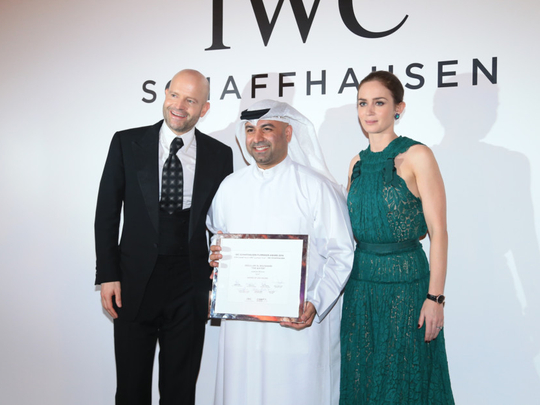
“This is historically unprecedented. The Ministry of Information have not produced a movie this big, ever, in the history of Kuwait,” said Abdullah Boushahri.
Last year, the Kuwaiti director won the $100,000 (Dh367,190) IWC Filmmaker Award for his film in development, The Water. The prize is given annually by Swiss watch manufacturer IWC Schaffhausen to a script that shows promise.
Boushahri went home with the first half of the money and will have access to the second half in 2016, when he plans to begin production on the film. He thinks his final budget will fall somewhere around $3 million dollars.
He calls the ambitious story is a period “epic”, centred around a drought that swept the city of Kuwait in the early 1900s, a topic that he considers sensitive.
“Not just in Kuwait, but the whole world. We talk about the lack of resources. When the oil dries, let’s say, the next war is on water. The next war is on resources,” he added.
THE CAST
Veteran Kuwaiti actress Hayat Al Fahad, who has acted in more than 80 television shows, will play the lead role. Actors Mohammad Al Mansour and Khaled Ameen will also star.
“I handed [Al Fahad] the script, and with an open heart, she said she would have the pleasure to read it and she did. She loved her character — the blind old lady, Mazza,” said Boushahri.
This will be Al Fahad’s first film role, outside of TV movies, in nearly four decades, since she last acted in Silence and Cruel Sea in the 1970s.
THE SCRIPT
Aside from casting, Boushahri spent the past year reworking the script, scouting a location to rebuild old Kuwait, finding a solid team and brushing up on his 20th-Century history.
This ‘development phase’, as he calls it, typically involves “reworking, revising or rewriting the script into version one, two and three, until it becomes the final script — the shooting script.” His latest milestone, secured at the end of 2015, was getting that script cleared by censors.
“It’s been a process, mind you, a long back-and-forth, because whenever you make any adjustment in the script, it has to go back to the committee. They have to read it, they have to give you notes,” he said.
“For a country like Kuwait that was a pioneer in cinema in the ’60s, there have been issues recently with censorship, so it’s a big step for us to have the seal, the stamp of the officials in Kuwait, that this movie is approved by them.”
THE LOCATION
The next box on Boushahri’s checklist was nailing the historical accuracy. Upon a recommendation from the Ministry of Information, who oversee audio-visual projects in Kuwait, Boushahri had to go through the Centre of Research and Studies for another stamp of approval.
“The language and the recreation of that time and those elements in culture, whether it’s props, buildings, villages, this and that,” explained Boushahri.
“We have to rebuild old Kuwait [and] the mud houses. This doesn’t exist anymore. We’re recreating something that doesn’t exist anymore in Kuwait.”
The process was helped along with the guidance of Dr Abdul Muttalib Al Balam, the head of the Department of Architecture at Kuwait University.
“We worked massively with him and fifteen of his Master’s students. This is very difficult — it took a long time to come up with the visual, how it’s going to look,” said Boushahri.
Salah Jamali will be in charge of the art direction and production design, and the main village will be built on a rare public beach in Kuwait, once again with approval from the government.
THE TEAM
Boushahri called his behind-the-scene crew his A-Team, a group of “superstars that will deliver excellent visual quality”.
“We have an Oscar-nominated, and Emmy-award nominated, team that worked on Game of Thrones, [which] is going to be our visual effects team,” he said.
Ahmad Shehata will head the team as the CGI Supervisor. As well as working on six episodes of Game of Thrones, Shehata, originally Egyptian, has worked on films such as Twilight: Breaking Dawn Part 2 and 22 Jump Street.
But before the team can get to work, Boushahri awaits the “final greenlight on funding from the Kuwaiti Ministry of Information”.
“We’re very optimistic that this is going to happen very soon,” he said. “I’m hoping, I’m keeping my fingers crossed, that before the end of December, we hear from them.”
After that, Boushahri predicts he will go into production sometime around March or April.













